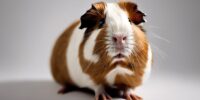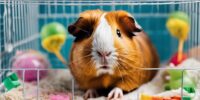What Quarantine Regulations May Affect Your Guinea Pig?

Quarantine regulations for guinea pigs are important to keep in mind when bringing a new pet into your home. It is essential to follow these guidelines to prevent the spread of any potential illnesses. Make sure to have a separate living space ready for your guinea pig during the quarantine period. This will help minimize contact with other pets in your household and reduce the risk of disease transmission. Additionally, always wash your hands before and after handling your guinea pig to maintain good hygiene practices. By following these regulations, you can ensure a smooth quarantine process and keep your pet healthy.
Stay informed to ensure a smooth quarantine process for your pet.
Key Takeaways
- Separate living space and minimize contact with other pets during quarantine.
- Regular observation for signs of sickness is crucial.
- Understand specific regulations for pet relocation and travel requirements.
- Provide spacious, well-ventilated enclosures and balanced diet during quarantine.
Understanding Quarantine Basics
To successfully implement quarantine measures for guinea pigs, owners must understand the fundamental principles of isolation and observation. Pet care is essential in ensuring the well-being of these small animals during this period. Quarantine plays a critical role in preventing the spread of diseases and safeguarding animal welfare.
During quarantine, it's important to separate the newly acquired guinea pig from existing ones to avoid potential transmission of illnesses. Owners should provide a separate living space, food, and water for the quarantined pet. Regular observation is key to identifying any signs of sickness early on, ensuring prompt veterinary care if needed.
Animal welfare should always be the top priority when implementing quarantine measures for guinea pigs. Owners must create a comfortable and stress-free environment for their pets during this time. By following proper quarantine protocols and focusing on pet care and animal welfare, owners can effectively protect their guinea pigs and promote a safe and healthy living environment.
Travel Restrictions for Pets
When considering travel with pets, it's important to be aware of the specific regulations and restrictions that may apply to guinea pigs. Pet relocation and animal transportation for guinea pigs require careful planning to guarantee the safety and well-being of these small animals. Different countries and even airlines may have varying rules regarding the transportation of pets, so it's critical to research and comply with these guidelines before starting on any journey with your guinea pig.
Before traveling with a guinea pig, it's vital to check if the destination country has any specific requirements for pet entry. Some places may necessitate health certificates, vaccinations, or even quarantine periods for incoming animals. Additionally, airlines often have policies regarding pet travel, including carrier specifications and booking procedures. Making sure that you have all the necessary documentation and accommodations in place will help make the pet relocation process smoother and less stressful for both you and your guinea pig.
Quarantine Facility Requirements
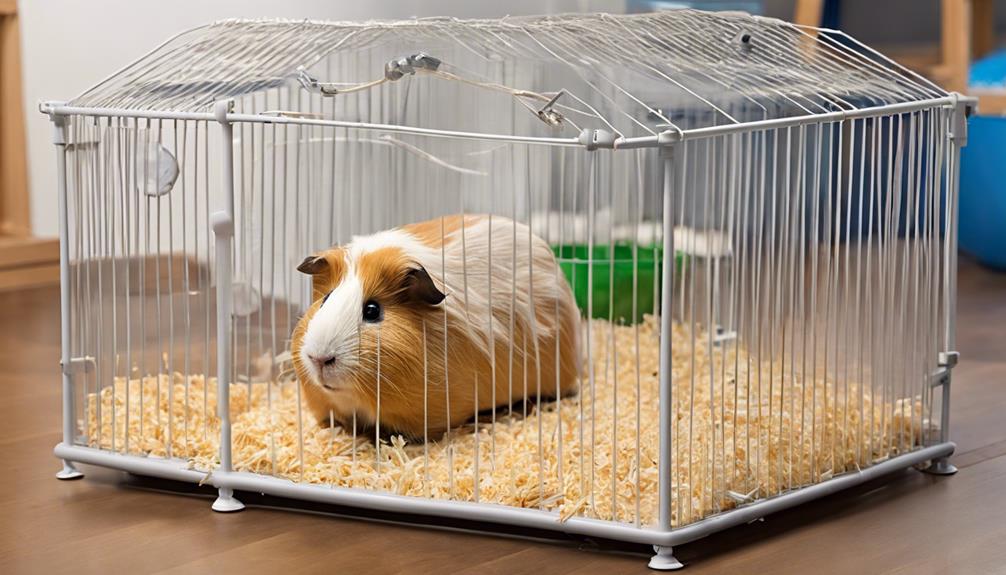
Ensuring proper quarantine facility requirements is essential for the safe and regulated transportation of guinea pigs. To provide the best care for these delicate animals during their quarantine period, the following factors must be carefully considered:
- Housing Accommodations: Guinea pigs require spacious and well-ventilated enclosures to prevent stress and guarantee their well-being. The quarantine facility should have separate enclosures for each guinea pig to avoid any potential conflicts and to monitor their health closely.
- Food Provisions: A balanced and nutritious diet is vital for guinea pigs to maintain their health and vitality. The quarantine facility must stock up on fresh hay, vegetables, and guinea pig pellets to cater to their dietary needs. Additionally, clean and fresh water should be provided at all times to keep them hydrated.
- Environmental Enrichment: Guinea pigs are social animals that thrive on mental stimulation. Providing toys, tunnels, and hiding spots in their quarantine enclosures can help alleviate boredom and reduce stress during their stay. Regular interaction and gentle handling from caretakers can also contribute to their well-being and overall happiness.
Health Certification Guidelines
The guinea pig quarantine regulations mandate strict adherence to health certification guidelines to guarantee the well-being of these delicate animals during transportation. Ensuring that guinea pigs have the necessary health certifications is critical in maintaining their overall health and preventing the spread of diseases. Here are some key aspects of health certification guidelines that owners need to take into account:
| Aspect | Description | Importance |
|---|---|---|
| Diet Restrictions | Specific dietary requirements based on age, health condition, and nutritional needs of the guinea pig. | Maintains good health |
| Exercise Limitations | Guidelines on the type and duration of exercise suitable for guinea pigs to prevent injuries. | Prevents accidents |
| Stress Management | Techniques to minimize stress during transportation and acclimation to a new environment. | Ensures well-being |
| Mental Stimulation | Strategies to provide mental enrichment and prevent boredom for a healthy and happy guinea pig. | Enhances quality of life |
Quarantine Duration Concerns
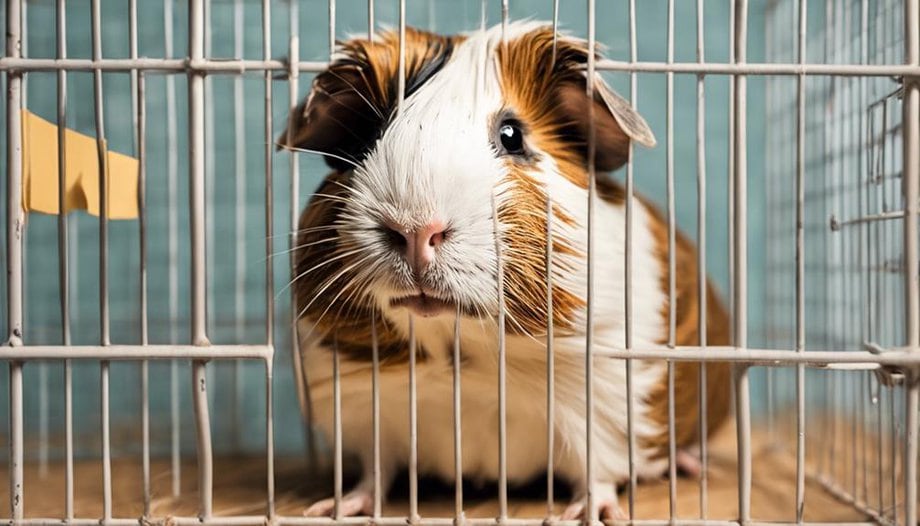
Implementing an appropriate quarantine duration is essential for safeguarding the health and well-being of guinea pigs during the transportation process. Guinea pigs require a period of isolation to prevent the spread of potential diseases and guarantee they're healthy before reintegrating into their living environment.
Here are three important considerations regarding quarantine duration:
- Health Evaluation: Guinea pigs should undergo thorough health assessments during quarantine to detect any signs of illness early on. Regular monitoring by a veterinarian can help identify and address any health concerns promptly.
- Environmental Enrichment: It's important to provide guinea pigs with a comfortable and enriching environment during quarantine to reduce stress levels. Adequate space, hiding spots, and toys can help alleviate the emotional impact of isolation.
- Caregiver Support: Caregivers play a critical role in providing emotional support to guinea pigs during quarantine. Spending time with them, offering treats, and gentle interactions can help alleviate any stress or anxiety they may experience.
Import and Export Regulations
Upon completing the quarantine period, guinea pig owners must adhere to specific import and export regulations to guarantee compliance with international animal transportation standards. It is essential to be aware of potential import delays and export restrictions that may impact the smooth transportation of guinea pigs across borders. Delays in importing guinea pigs can occur due to paperwork issues, health concerns, or inspections at customs. On the other hand, export restrictions may involve certain countries prohibiting the export of guinea pigs or imposing strict guidelines for their transportation.
To provide a clear overview, below is a table outlining some common import and export regulations that guinea pig owners should consider:
| Regulation Type | Description |
|---|---|
| Import Delays | Potential delays in importing guinea pigs. |
| Export Restrictions | Restrictions on exporting guinea pigs. |
Quarantine Monitoring Procedures
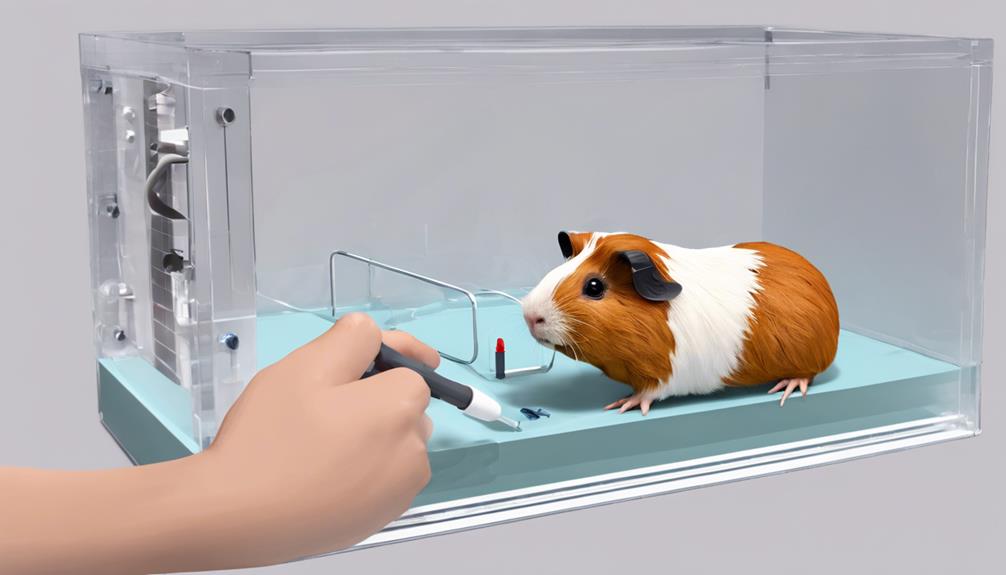
Quarantine monitoring procedures for guinea pigs entail strict adherence to health check requirements and isolation duration guidelines.
To prevent the spread of diseases and guarantee the well-being of the animals, regular health assessments are essential during the quarantine period.
Understanding and following these procedures are vital for maintaining the health and safety of both the guinea pigs and other animals.
Health Check Requirements
Regular health checks are essential during the quarantine period to monitor the well-being of guinea pigs.
- Daily Monitoring: Make sure to conduct daily checks for any signs of illness such as lethargy, loss of appetite, or unusual behavior.
- Veterinary Consultation: Seek advice from a veterinarian if there are any concerns about the guinea pig's health to address issues promptly.
- Documentation: Maintain detailed records of health observations and any treatments administered to track the guinea pig's progress accurately.
Isolation Duration Guidelines
Monitoring the isolation duration guidelines for guinea pig quarantine involves diligent observation and documentation of the animal's health and behavior. Isolation stress can have a significant impact on guinea pigs, affecting their overall well-being and immune system.
During the quarantine period, it's important to assess how the guinea pig is coping with being separated from its usual environment and companions. The duration of isolation can vary depending on the specific quarantine regulations in place, but it's essential to balance the need for isolation with the potential negative effects of prolonged separation.
Tips for Quarantine Preparation
Preparing for the necessary quarantine period involves setting up a designated area with all essential supplies and ensuring the comfort and safety of the new arrival. To guarantee a smooth quarantine process for your guinea pig, consider the following tips:
- Food Storage: Stock up on your guinea pig's regular food, hay, and treats to last throughout the quarantine period. Proper food storage is crucial to maintain freshness and prevent contamination. Store food in airtight containers in a cool, dry place away from direct sunlight.
- Cage Setup: Prepare a clean and spacious cage for your guinea pig with fresh bedding, hiding spots, and chew toys. Make sure the cage is secure and well-ventilated to provide a comfortable environment. Place the cage in a quiet area away from drafts and extreme temperatures.
- Health Monitoring: Keep a daily log to track your guinea pig's behavior, food intake, and any potential health concerns. Regularly monitor their weight, temperature, and overall well-being to ensure they're thriving during the quarantine period.
Frequently Asked Questions
Can Guinea Pigs Transmit Diseases to Other Animals During Quarantine?
During quarantine, guinea pigs can transmit diseases to other animals if precautions aren't taken. Animal interactions pose risks, so it is crucial to follow proper quarantine protocols to prevent disease transmission and guarantee the well-being of all pets involved.
Are There Any Specific Temperature or Humidity Requirements for Guinea Pigs During Quarantine?
In quarantine, guinea pigs benefit from a cozy environment with appropriate heating to maintain comfort. Controlling humidity levels is vital for their well-being. Alongside dietary needs and exercise requirements, ensuring these conditions fosters a healthy quarantine experience.
How Often Are Guinea Pigs Monitored by Quarantine Officials During Their Stay?
Quarantine officials monitor guinea pigs regularly during their stay, adhering to set guidelines. Interaction protocols guarantee the well-being of the guinea pigs. This helps maintain health standards and provides necessary care while in quarantine.
Can Guinea Pigs Be Housed Together With Other Animals in Quarantine Facilities?
Compatibility concerns arise when housing guinea pigs with other animals in quarantine facilities. Socialization strategies may vary, emphasizing safety and well-being. Guidelines aim to guarantee all animals remain healthy and stress-free during their stay, promoting a harmonious environment.
What Happens if a Guinea Pig Becomes Ill During Quarantine?
If a guinea pig falls ill during quarantine, it will receive prompt veterinary care. Treatment options vary based on the diagnosis. The pig may need isolation protocols to prevent spread. Recovery timeframes depend on the illness and the individual's response.

